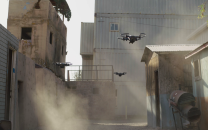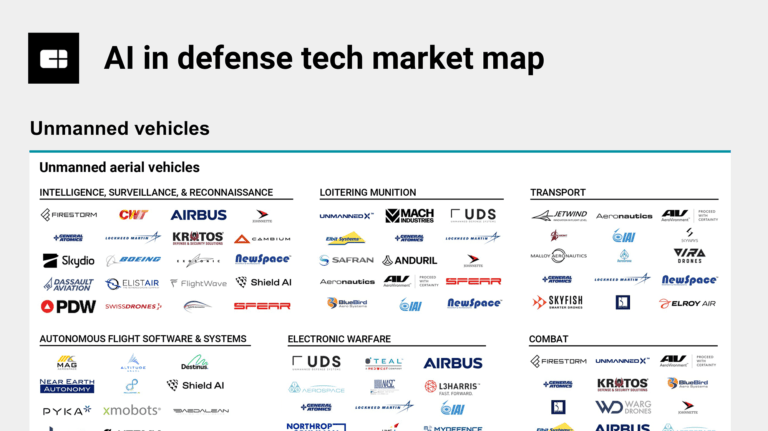
Shield AI
Founded Year
2015Stage
Debt - III | AliveTotal Raised
$1.071BValuation
$0000Last Raised
$200M | 10 mos agoAbout Shield AI
Shield AI specializes in artificial intelligence for aviation, focusing on developing autonomous artificial intelligence (AI) pilots for various aircraft within the defense technology sector. The company's flagship product, Hivemind, enables drones and aircraft to operate autonomously without the need for global positioning systems (GPS), communications, or human pilots and is designed to adapt and react to dynamic environments in both military and commercial settings. It was founded in 2015 and is based in San Diego, California.
Loading...
Shield AI's Product Videos


ESPs containing Shield AI
The ESP matrix leverages data and analyst insight to identify and rank leading companies in a given technology landscape.
The autonomous flight software & systems market focuses on technologies and platforms that enable aircraft to operate without human intervention. This market includes solutions such as commercial drones, military unmanned aerial vehicles (UAVs), urban air mobility solutions, and autonomous cargo delivery systems. Key technologies driving this market include advanced sensors, artificial intelligenc…
Shield AI named as Leader among 10 other companies, including Altitude Angel, Merlin Labs, and Pyka.
Shield AI's Products & Differentiators
Hivemind
Shield AI’s stand-out product is Hivemind, an autonomy and artificial intelligence stack for military and commercial aircraft, designed from the ground up to be multi-role, multi-vehicle. Simply put, it is self-driving technology for aircraft. Hivemind enables swarms of aircraft to maneuver fully autonomously on the edge in high threat, GPS and communication degraded environments. It uses state-of-the-art path-planning, mapping, state-estimation, and computer vision algorithms, combined with reinforcement learning and simulations, to train unmanned systems to execute a variety of missions – from infantry clearance operations to breaching integrated air defense systems with unmanned aircraft.
Loading...
Research containing Shield AI
Get data-driven expert analysis from the CB Insights Intelligence Unit.
CB Insights Intelligence Analysts have mentioned Shield AI in 1 CB Insights research brief, most recently on Aug 14, 2024.

Aug 14, 2024
The AI in defense tech market mapExpert Collections containing Shield AI
Expert Collections are analyst-curated lists that highlight the companies you need to know in the most important technology spaces.
Shield AI is included in 7 Expert Collections, including Unicorns- Billion Dollar Startups.
Unicorns- Billion Dollar Startups
1,249 items
AI 100
399 items
Winners of CB Insights' annual AI 100, a list of the 100 most promising AI startups in the world.
Game Changers 2018
70 items
Aerospace & Space Tech
2,890 items
These companies provide a variety of solutions, ranging from industrial drones to electrical vertical takeoff vehicles, space launch systems to satellites, and everything in between
Defense Tech
1,269 items
Defense tech is a broad field that encompasses everything from weapons systems and equipment to geospatial intelligence and robotics. Company categorization is not mutually exclusive.
AI 100 (2024)
100 items
Shield AI Patents
Shield AI has filed 4 patents.
The 3 most popular patent topics include:
- 3d imaging
- automation
- biometrics

Application Date | Grant Date | Title | Related Topics | Status |
|---|---|---|---|---|
1/16/2019 | 4/14/2020 | Maintenance, Huawei mobile phones, Cooling technology, Automation, Mechanical engineering | Grant |
Application Date | 1/16/2019 |
|---|---|
Grant Date | 4/14/2020 |
Title | |
Related Topics | Maintenance, Huawei mobile phones, Cooling technology, Automation, Mechanical engineering |
Status | Grant |
Latest Shield AI News
Nov 1, 2024
US-made jam-resistant drones helped Ukrainians cut through Russia EW Shield AI’s V-BATs are giving Kyiv new range, capabilities. October 31, 2024 09:02 PM ET When Russian jamming neutered the recon drones flown by a group of Ukrainian special operators near Dnipro in August, they turned to a new solution: V-BAT drones built to withstand the massive electronic interference used by both sides in the war in Ukraine. “They launched from about 40 kilometers from the front, flew 100 kilometers past the front line of troops and then found these SA-11 surface-to-air missiles [on] 11 Buks , targeted them, called in HIMARS airburst rounds,” said Brandon Tseng, president and co-founder of Shield AI, the San Diego-based maker of the V-BATs. That destroyed the SAMs—and, Tseng said, marked a big operational test for the V-BATs: flying, collecting targeting data, and relaying it to artillery units, all in the face of the most sophisticated electronic warfare tactics on earth. Ukraine has some drones that can perform well against EW, but they work through autonomy and on-platform computing, good for one-way attack missions with whatever munitions can be squeezed onboard. But the ability to pass data quickly back to a fires solution with real power, like a howitzer or Lockheed Martin HIMARS , is essential to taking out Russian positions. This is what the V-BAT supplied to the Ukrainians, according to Tseng, who witnessed the operation first-hand. The 300-mile range of the V-BAT, even in the face of anti-aircraft defenses, gave the Ukrainians a new view of the battlefield. “They were able to collect intelligence that they had never collected before was because they had a long-endurance aircraft that was able to watch things for long periods of time,” Tseng said in a Thursday interview. “That absolutely blew their minds, because, while they had some aircraft, some weapon systems that could go 60 kilometers, maybe 100 kilometers, the on-station time was like, for those aircraft for like, 10,15, minutes. So when you're comparing it against us who's loitering around for eight, 9,10, 11 hours, you know, after we get on-station…you just actually have the time space to actually find lots and lots of targets.” Related articles Tseng and his team at Shield AI originally brought the drones to Ukraine to test against electromagnetic warfare effects in June. The drones proved able to work in jam-heavy environments in ways that others could not, according to a June report from the Ukrainian military obtained by Defense One. “We flew within 1,000 meters of these jammers. No impact to our aircraft. It was wildly successful,” Tseng said. But those June results didn’t have the persuasive effect that Tseng was hoping for. “There were skeptics on the NATO side, on the American side, that were like, ‘You know, no one's passed this testing. All drones fail here; you guys are going to be like everybody else.’” They insisted on an actual battlefield experiment against the enemy. Tseng’s account was backed up by a Ukrainian operator who spoke to the Wall Street Journal on Thursday. In August, Tseng also testified before Congress on the battlefield deployment success. There is no silver bullet that can bring Ukraine victory, Defense Department officials routinely remind the public, often when discussing why they refuse to provide certain weapons, (or withhold permissions to use them in the way the Ukrainians would like). Despite that, some common themes are emerging after years of war. Ukraine’s success against the larger Russian military is based in large part on their ability to move faster, firing off rounds and maneuvering quickly to duck Russian counterfire. But the Russians are fast learners. The Russians are far better supplied with ammunition, a problem exacerbated by continued debates among Western allies about whether to provide Ukraine with what observers say it needs. The V-BAT works to lessen both problems. First, its size—small enough to fit in an SUV—and vertical takeoff help the Ukrainians scoot and shoot. “Airstrips, air fields are targeted. They're observed. They're watched, and so they're just highly vulnerable points. So if your aircraft requires a runway, it's really not a good, great place to be,” Tseng said. And because the V-BAT can pass not just targeting data but also battle damage assessment, it helps Ukrainian forces make the most of their limited ammo. Without EW-hardened drones, Tseng said, “they don't know if they're hitting things most of the time.” Tseng said the next step is to integrate missiles onto the drone itself. “We have launched, organically off the V-BAT, a Northrop Grumman munition called the Hatchet, which is a laser-guided munition that was a prototype capability [for] board kinetic effects, is being released late next year.” Share This:
Shield AI Frequently Asked Questions (FAQ)
When was Shield AI founded?
Shield AI was founded in 2015.
Where is Shield AI's headquarters?
Shield AI's headquarters is located at 600 West Broadway, San Diego.
What is Shield AI's latest funding round?
Shield AI's latest funding round is Debt - III.
How much did Shield AI raise?
Shield AI raised a total of $1.071B.
Who are the investors of Shield AI?
Investors of Shield AI include Hercules Capital, Andreessen Horowitz, Point72 Ventures, Disruptive, Riot Ventures and 11 more.
Who are Shield AI's competitors?
Competitors of Shield AI include Anduril and 7 more.
What products does Shield AI offer?
Shield AI's products include Hivemind and 2 more.
Loading...
Compare Shield AI to Competitors

Anduril builds defense products to aid in the protection of borders, infrastructure, and national security assets. It develops border control technology, including towers with cameras, infrared sensors to track movement, air, and underwater systems for various defense and commercial missions, and more. The company was founded in 2017 and is based in Orange County, California.
Aretec specializes in data science and technology solutions. The company offers a range of products and services including data analytics, artificial intelligence (AI) enabled tools, application development, cybersecurity, and cloud solutions, all designed to help businesses unlock the potential of their data and make informed decisions. It primarily serves sectors such as the public sector, fintech, and the private sector. It was founded in 2005 and is based in Fairfax, Virginia.
In-Q-Tel is a strategic investor focused on accelerating the development and delivery of cutting-edge technologies in the national security domain. The company partners with innovative startups and provides investment to enhance the national security of the United States, offering services such as technology analysis and venture-backed startup partnerships. In-Q-Tel primarily serves U.S. government agencies with a need for advanced security technologies. In-Q-Tel was formerly known as Peleus and In-Q-It. It was founded in 1999 and is based in Arlington, Virginia. In-Q-Tel operates as a subsidiary of Central Intelligence Agency.
Second Front Systems (2F) fast-tracks government access to software-as-a-service (SaaS) applications for national security missions. The platform provides features such as visualization of all apps and their statuses, details of security and release pipelines, and the ability to view applications' vulnerabilities. The company was founded in 2014 and is based in Wilmington, United States.

Rebellion Defense focuses on developing advanced software for the defense and national security sector. The company offers products that provide real-time entity identification and tracking for complex threat environments, as well as tools to understand and emulate global cyber threats. Rebellion Defense primarily serves mission-critical organizations within the defense industry. It was founded in 2019 and is based in Washington, DC.
Cognitive Space specializes in artificial intelligence (AI) software as a service (SaaS) for intelligent satellite automation within the space industry. The company offers solutions that manage mission planning, yield, and controls scheduling latencies for satellite operators and government entities. Cognitive Space primarily serves satellite operators and government sectors seeking to optimize space capacity. It was founded in 2018 and is based in Houston, Texas.
Loading...